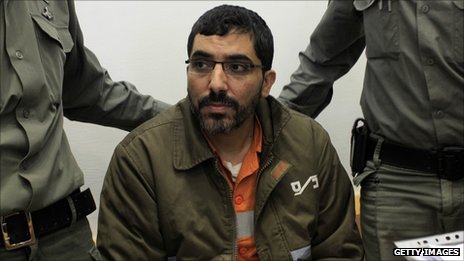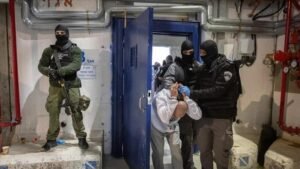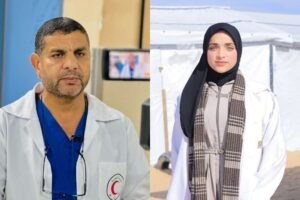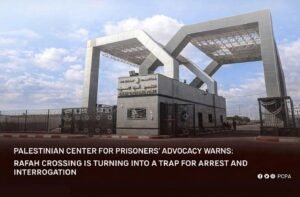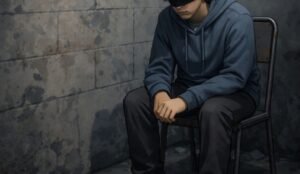The Palestinian prisoner, engineer Dirar Abu Sisi, who holds a PhD in electrical engineering and is one of the brilliant and creative Palestinian minds, worked as an engineer at the Gaza Electricity Company. He successfully developed innovative projects that overcame the problem of power station shutdowns and network outages. Because of this, he became a target of the Israeli Mossad. While traveling to Ukraine, he was kidnapped in 2011 and then transferred to Israel, where he was subjected to torture and solitary confinement. He was sentenced to 21 years in prison and was later released in a prisoner exchange deal during the genocide war on the Gaza Strip.
The Palestinian Center for Prisoners Advocacy contacted Mousa, the son of released prisoner Dirar Abu Sisi, to shed light on one of the chapters of Palestinian resistance — the story of a Palestinian family torn apart by the occupation, a pain that continues to this day. Mousa, the eldest son of engineer Abu Sisi, recounts part of their tragedy:
“My father was a well-known engineer holding a PhD in engineering from Ukraine. He worked as the operations director at the only power plant in the Gaza Strip. After the war on the Strip in 2008–2009, and as the security and economic situation worsened, my parents began thinking about leaving Gaza to find a safer life for our family.
In early 2011, my father traveled with my Ukrainian mother and my younger brother to Ukraine so he could apply for Ukrainian citizenship through my mother, who is of Ukrainian origin. His goal was simply humanitarian — to enable us to travel abroad and build a secure future. He had received many job offers from different countries and was seeking a dignified life for us. But a journey that began with hope ended in abduction.”
Mousa continues: “My father was kidnapped while traveling by train from Kharkiv to Kyiv with my uncle, who had come from the Netherlands and hadn’t seen my father in 16 years. During the trip, three men entered the cabin and asked for his identification documents. When my father asked about their work, they replied they were from Ukrainian intelligence and asked him to quietly accompany them. He was then taken to an unknown location.
Later, as he told us, he found himself in the presence of several people, including a senior official from Israeli Mossad. They interrogated and brutally beat him for three hours, then tied him up, placed him inside a closed coffin, transported him to the airport, and put him on a plane to Israel after a short stop at an unknown destination.”
“At that time,” Mousa recalls, “the family was in shock. We didn’t know where he was or whether he was still alive. My mother searched hospitals, cemeteries, and police stations in Ukraine in vain. We were living a nightmare of fear and anxiety. After about two weeks, the long-awaited call came. My father said: ‘I’m in Israel, in Petah Tikva. This is my lawyer’s number. Contact her.’
Those few words were all he could say. We then learned he was detained by Israeli security forces after being illegally abducted from Ukraine. He spent three consecutive years in solitary confinement, during which he wasn’t allowed to meet or see anyone alone. That period broke him psychologically and physically. In 2014, he was transferred to shared cells with other prisoners, and in 2015 he was sentenced to 21 years in prison.”
Mousa continues: “When the genocide in Gaza began in October 2023, all communication with my father was cut off. We couldn’t hear his voice or know anything about him. No Palestinian prisoner was allowed to contact their families during that period. We were left in complete darkness, not knowing whether he was alive or dead. Then on 27 February 2025, he was released in a prisoner exchange deal.
When we saw the photos, we could barely recognize him. His nose was broken, his ribs fractured, and his body was terrifyingly thin — just skin and bone. He told us about daily beatings, continuous torture, and how he was denied medical glasses for years, which caused chronic vision problems. He described the horror inside the prisons and the cruelty faced by him and other prisoners, while authorities deliberately hid any information. We had sent lawyers many times to visit him, but each time the Israeli authorities claimed his name didn’t exist in the system or in that prison — a systematic attempt to conceal the deadly abuses he was subjected to.”
Mousa adds: “My father spent many years behind bars, away from us and from the life he dreamed of giving us. After 14 years of captivity, he was finally released in a prisoner exchange deal between the Palestinian resistance and the Israeli occupation and returned to Gaza. But the story didn’t end there. By the time my father was released, we had already left Gaza during the war and were scattered in different places. My father now lives alone in Gaza, unable to leave because of the blockade and closure of all crossings. We live far away, waiting once again for the day we can be reunited.”

